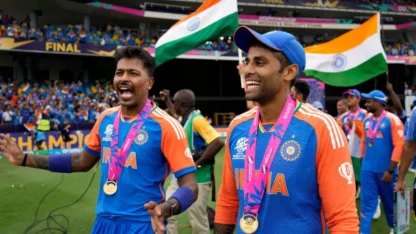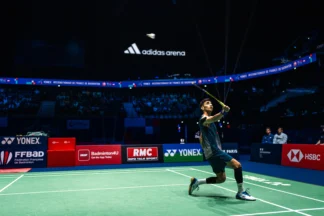Indian badminton‘s top doubles pair, Satwiksairaj Rankireddy and Chirag Shetty, are set to continue without a coach for some time after their former mentor, Mathias Boe, resigned post-Olympics. As the duo looks to regain their top form, discussions around a potential return of Malaysian coach Tan Kim Her to the Indian badminton setup have raised hopes. However, questions around the current state of the national camp and team selection processes continue to cloud the sport.
Satwiksairaj Rankireddy-Chirag Shetty: Coachless yet again
The Indian pair, ranked world No. 4 in the BWF rankings, has been left without a coach since Mathias Boe stepped down following their quarterfinal defeat at the Paris Olympics. Boe, who played a pivotal role in their rise on the international stage, has stated that he will not return to coaching in the near future. While the Badminton Association of India (BAI) has reportedly been in talks with potential coaches from Malaysia and Indonesia, Satwik and Chirag remain without a formal coach as they prepare for upcoming international tournaments.
Tan Kim Her, who initially paired Satwik and Chirag during his first tenure with the Indian team from 2015 to 2019, could return to help restructure the doubles setup. His guidance during that period is credited with laying the foundation for India’s rise in doubles badminton, nurturing not only Satwik and Chirag but also other key players such as Ashwini Ponnappa and Sikki Reddy. Despite these promising developments, the duo is expected to remain coachless for the immediate future.
Lack of Badminton national camp Raises Concerns
Despite ongoing international tournaments and the approach of key events, there has been no national camp post-Olympics for top Indian players, leaving many in the badminton community puzzled. Speaking to Insidesport, a top Indian player shared the frustration on condition of anonymity: “I am not sure because there is no news of camp or coaches or anything. All players are also waiting.”
The absence of a structured national camp raises questions about the selection criteria for international tournaments. Players and insiders are left questioning the transparency and fairness of team selections for the top BWF tournaments post-Paris Olympics.
“Every junior and other players are asking me and the performances are showing. Everyone has no answer. Only their favourites going in the team where are the rules now. Earlier when you are following the rules, now why keep changing.”
The lack of clarity has led to growing discontent among junior and emerging players, many of whom feel overlooked without proper trials or selection processes.
“Indian Badminton is Going Down”
The same Indian badminton player voiced concerns about the direction the sport is heading, citing a lack of long-term planning and failure to pick up fresh talent. “Sorry to say, but Indian badminton is going down. I don’t see any future if it’s going to continue like this,” the player said.
The absence of clear leadership within BAI has further compounded the problem. According to the player, there is a disconnect between the coaching staff, the BAI, and the Sports Authority of India (SAI). It seems like the head coach Pullela Gopichand is also not aware about what future holds.
Future of India doubles Badminton in limbo
While Satwik and Chirag remain India’s only world-class men’s doubles pair, the lack of depth in other categories is glaring. “Other countries have 5-6 pairs with good standards, and another 5-6 pairs in line,” the player noted, expressing concern over the future of Indian badminton. The duo’s success, while commendable, highlights the lack of investment in developing future stars across all disciplines, from men’s and women’s doubles to mixed doubles.
While Tan Kim Her’s potential return could bring some much-needed stability to Indian doubles, it is evident that the challenges facing Indian badminton extend beyond just coaching. Without a well-structured national camp, a clear selection process, and stronger leadership, the long-term success of the sport in India remains uncertain.
Editor's Pick
 Cricket
Probable India squad for T20 World Cup 2026: Sanju Samson in, no place for Rinku Singh
Cricket
Probable India squad for T20 World Cup 2026: Sanju Samson in, no place for Rinku Singh











































































